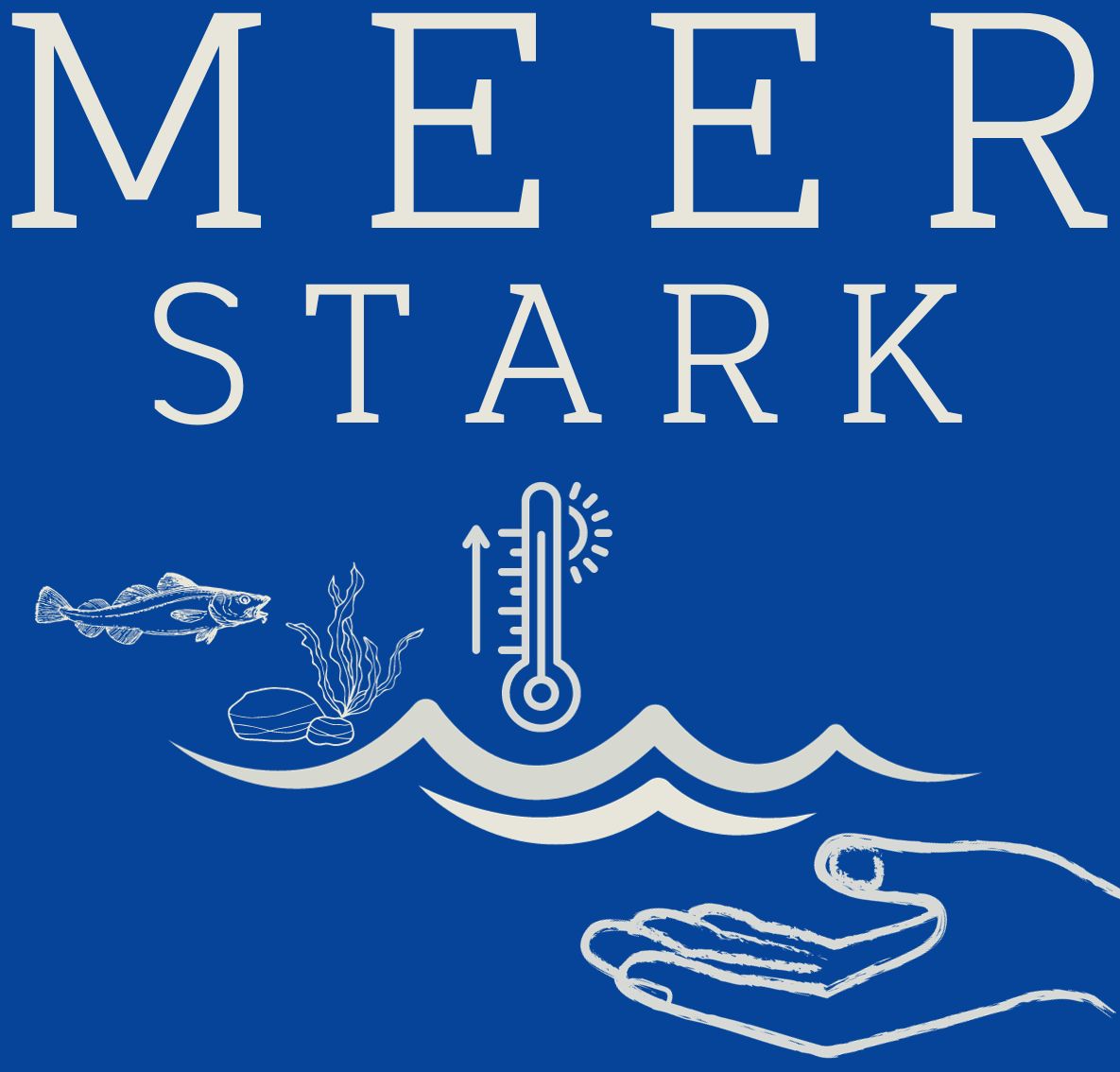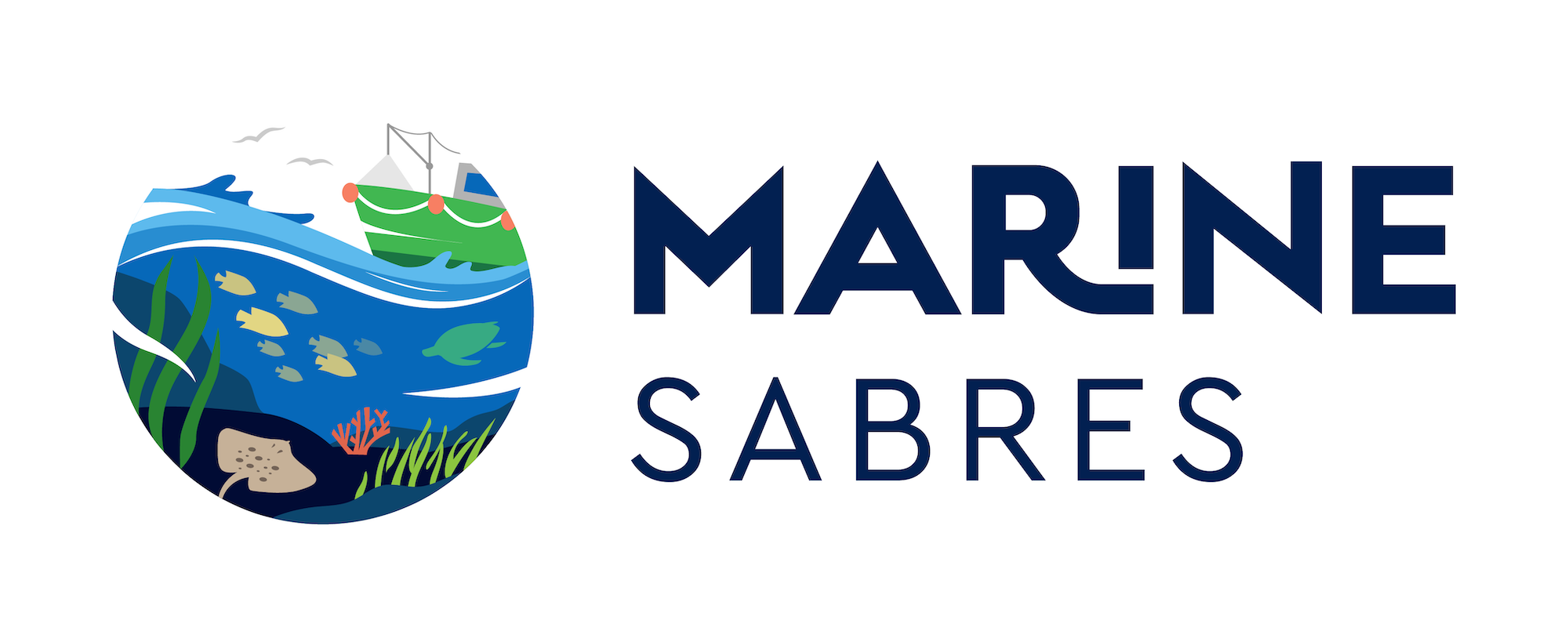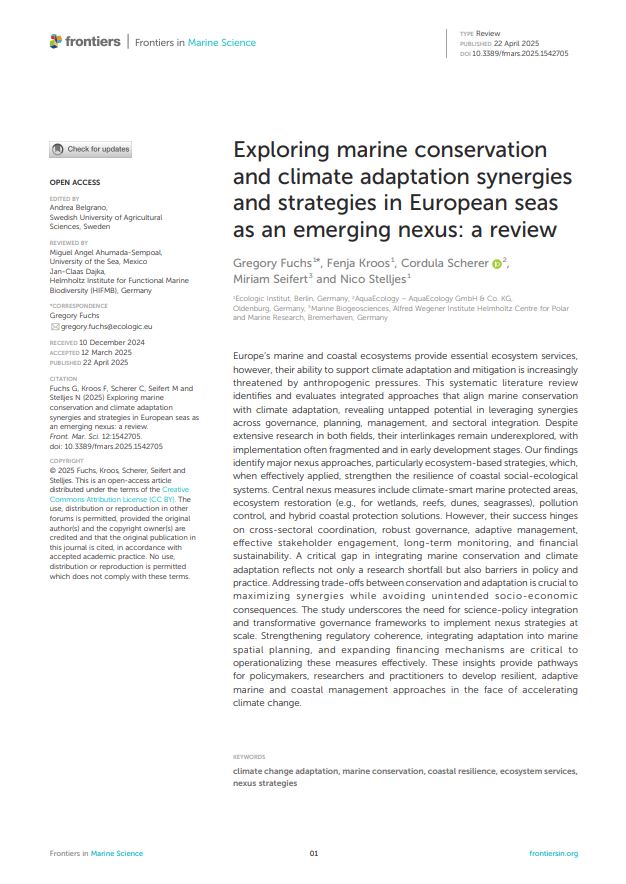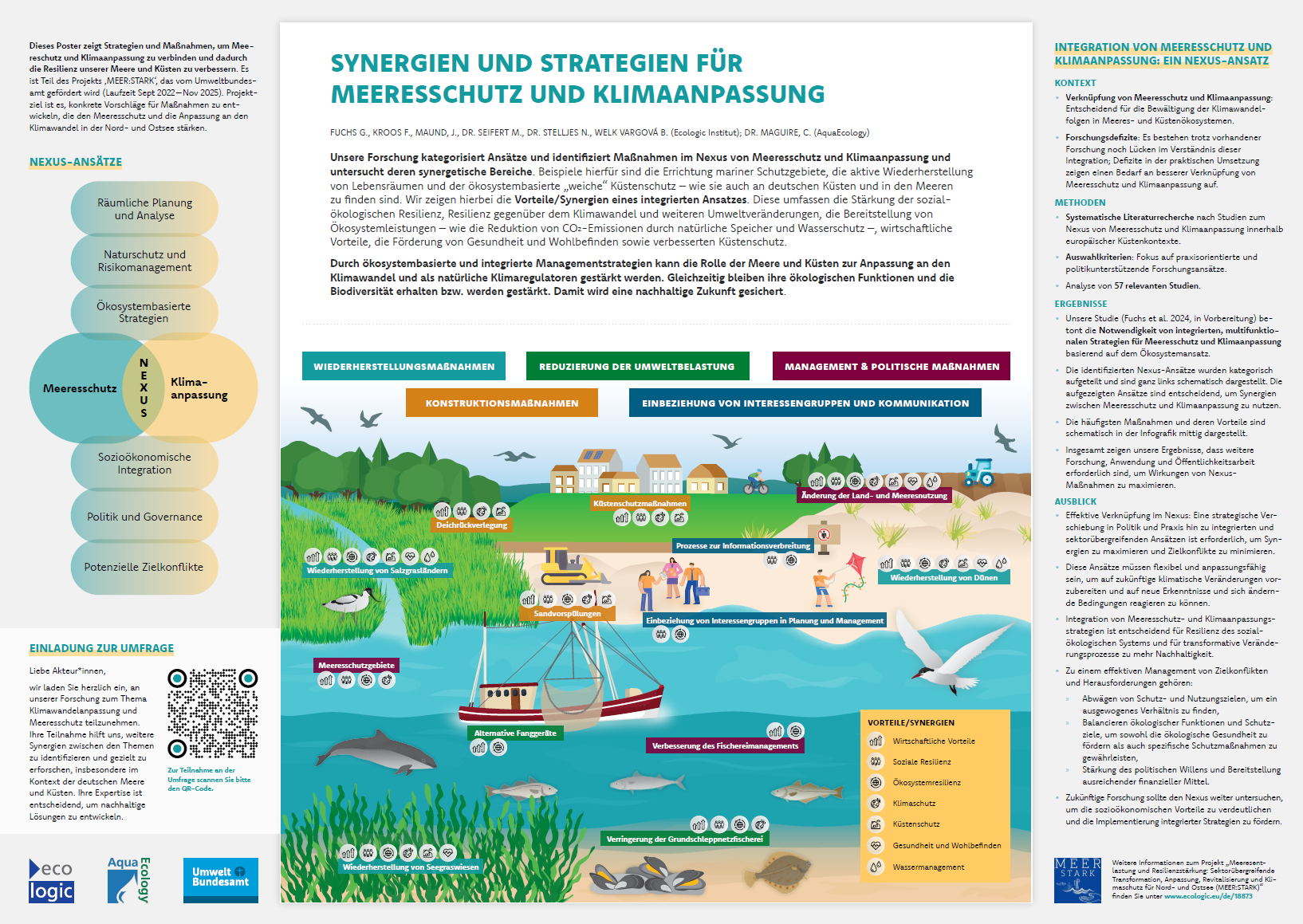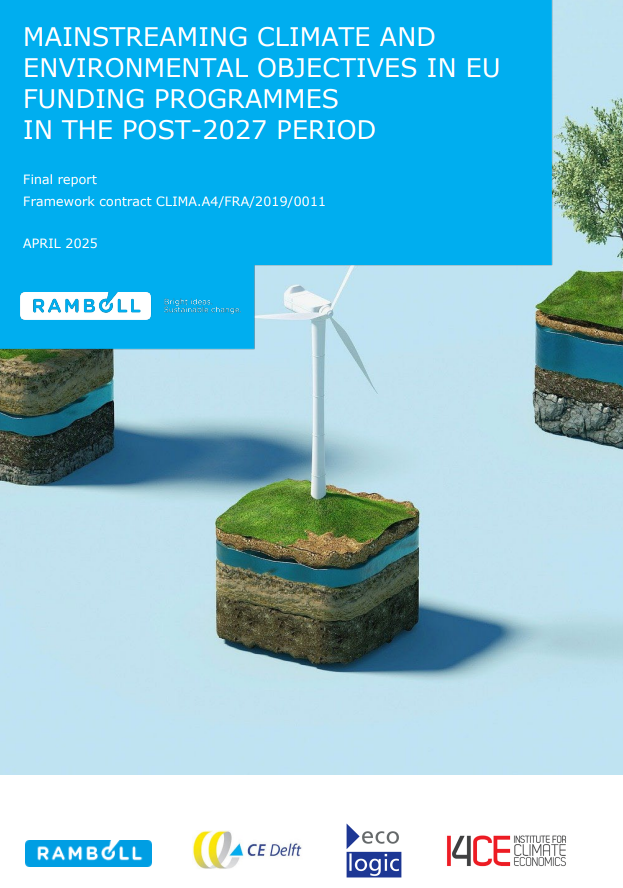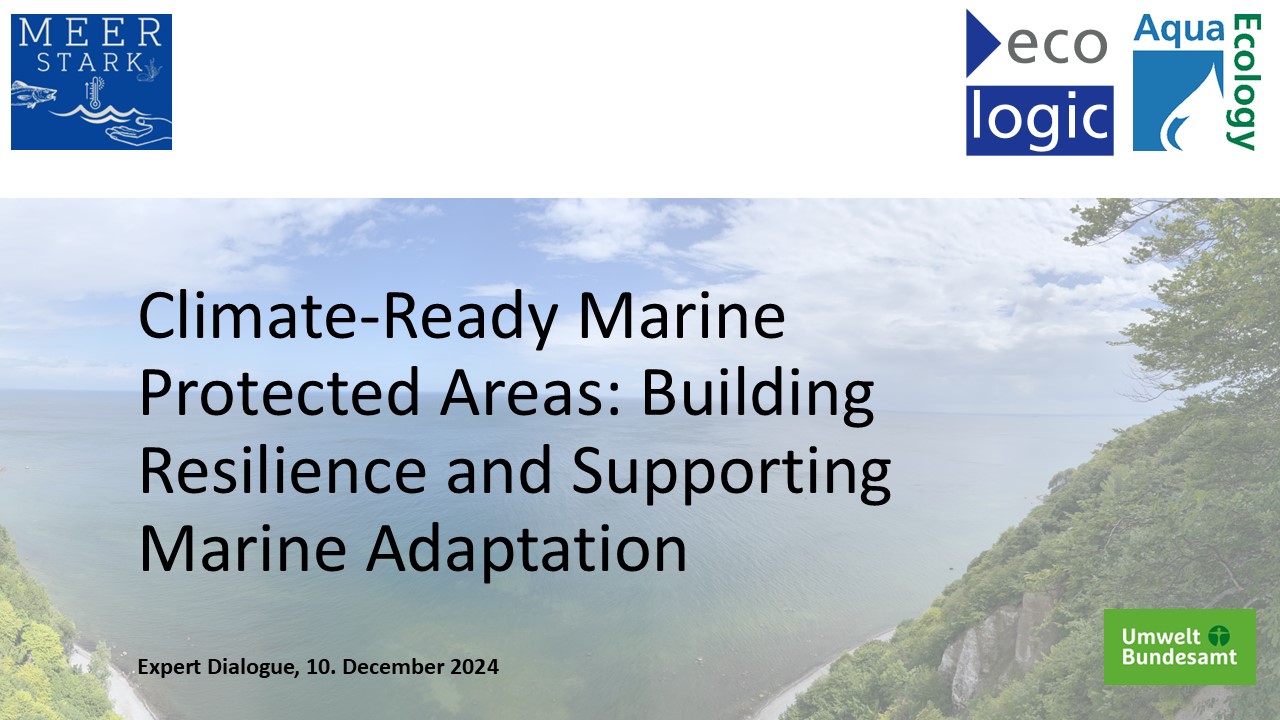
Fenja Kroos
MSc (Environmental Protection and Management)
BSc (Geography International)
Researcher
- Team
- Topics
Fenja Kroos is a Researcher at the Ecologic Institute in Berlin. Her work focuses on biodiversity, nature restoration and nature-based solutions, as well as marine and Arctic topics. She also contributes to the international climate negotiations, supporting the German delegation in negotiations under the UNFCCC, the Kyoto Protocol, and the Paris Agreement. Her work spans natural climate change adaptation, financing biodiversity, the EU Forest Strategy, the 3 Billion Trees Initiative, as well as marine and Arctic governance. Fenja Kroos works in English and German.
For the Ecologic Institute, Fenja Kroos is involved in a variety of projects that deal among other things with Arctic governance, policy, and knowledge transfer. This includes the "YESSS – Year-round EcoSystem Study on Svalbard: Seasonally resolving ecosystem functioning in a warming Arctic" project and the project "DynARC: A pluralistic approach to dynamic marine conservation in the Arctic".
Moreover, Fenja Kroos was actively involved in a project to support EU Member States in implementing the Nature Restoration Law. For Germany, she is working on a project commissioned by the Federal Agency for Nature Conservation to support the national implementation of the nature restoration targets, particularly the planning of the national restoration plans.
In the MEER:STARK project, she is researching cross-sectoral cooperation for resilient ecosystems and sustainable climate adaptation in the North and Baltic Seas. In addition, she was actively involved in the EU Mission for the Restoration of Oceans, Seas and Waters, a strategic initiative to conserve and restore marine and aquatic ecosystems across the EU. She is furthermore involved in the Marine SABRES project, which aims to apply social-ecological systems thinking and an ecosystem approach to develop targeted solutions to marine biodiversity loss.
She also worked on a project to mainstream climate and environmental objectives in EU funding programmes in the post-2027 period, as well as on a feasibility study on carbon sequestration through area-based nature conservation measures, particularly through the integration of biodiversity-enhancing measures into land use and on nature-based solutions for municipalities. She also works on issues related to the polycrisis, with a focus on climate change, biodiversity loss, and pollution.
Before her work at the Ecologic Institute, Fenja Kroos headed the biodiversity working group at the organisation Generation Climate Europe. She coordinated three teams respectively on nature restoration, the EU Biodiversity Strategy and nature-based solutions. She also used to be the social media coordinator for the Scottish Arctic Network, where she was also a member of the steering group during its inception.
Fenja Kroos holds a master's degree in Environmental Protection and Management from the University of Edinburgh (Scotland). Her thesis focussed on the role and function of Arctic networks. She completed her bachelor's degree in Geography International with a minor in Physical Oceanography at the University of Hamburg (Germany). Her bachelor thesis focussed on the geopolitical responses to retreating sea ice in the Arctic. During her bachelor studies, Fenja Kroos spent two semesters at the University of Calgary (Canada), where she focussed on climate change, ecosystems and Arctic System Science.
Contact Fenja Kroos by Email
Selected projects by Fenja Kroos
Arctic
Dynamic Protection and Adaptive Management – Arctic marine protection facing climate change (DynArc)
- Duration
-
-
- Funding
-
Federal Agency for Nature Conservation (BfN), Germany
Year-round EcoSystem Study on Svalbard (YESSS)
- Duration
-
-
- Funding
-
Federal Ministry of Education and Research (BMBF), Germany
Marine
Mission Ocean, Seas and Waters Implementation Support Platform
- Duration
-
-
- Funding
-
European Climate, Infrastructure and Environment Executive Agency (CINEA), International
Marine Systems Approaches for Biodiversity Resilience and Ecosystem Sustainability (HEU Marine SABRES)
- Duration
-
-
- Funding
-
European Commission, Directorate-General Research & Innovation (DG Research & Innovation), International
Biodiversity, nature-based solutions and green infrastructure
Analytical and Technical Support During the Negotiations Process for the Nature Restoration Law
- Duration
-
-
- Funding
-
European Commission, Directorate-General Environment (DG Environment), International
Supporting the National Implementation of Nature Restoration Targets
- Duration
-
-
- Funding
-
Federal Agency for Nature Conservation (BfN), Germany
Challenges for International Climate Protection in the Face of the Global Triple Crisis
- Duration
-
-
- Funding
-
German Environment Agency (UBA), Germany
Bild von Gerd Altmann auf Pixabay
https://pixabay.com/de/illustrations/europa-wiese-gr%C3%BCn-green-deal-4689510/
Mainstreaming Climate and Environmental Objectives in EU Funding Programmes in the Post-2027 Period
- Duration
-
-
- Funding
-
European Commission, Directorate-General for Climate Action (DG Climate), International
Climate Adaptation Naturally!
- Duration
-
-
- Funding
-
German Environment Agency (UBA), Germany
International climate negotiations
Support for the International Climate Negotiations under the UNFCCC, Paris Agreement and Kyoto Protocol
- Duration
-
-
- Funding
-
Federal Foreign Office (AA), Germany
Selected publications by Fenja Kroos
Marine
Fuchs G, Kroos F, Scherer C, Seifert M and Stelljes N (2025) Exploring marine conservation and climate adaptation synergies and strategies in European seas as an emerging nexus: a review. Front. Mar. Sci. 12:1542705. doi: 10.3389/fmars.2025.1542705
Fuchs, Gregory et al. 2024: Synergien und Strategien für Meersschutz und Klimaanpassung. Poster. Ecologic Institute: Berlin.
Biodiversity, nature-based solutions and green infrastructure
European Commission: Directorate-General for Climate Action, Ecologic Institute, Ramboll Management Consulting, Kroos, F., Elkina, E. et al., Good practice examples of nature-based solutions across sectors – Mainstreaming climate and environmental objectives in EU funding programmes in the post-2027 period, Publications Office of the European Union, 2025, https://data.europa.eu/doi/10.2834/1306343
Iwaszuk, E.; Spantzel, T.; Kroos, F.; Knoblauch, D. (2025): Integrated Approaches to Addressing the Triple Planetary Crisis: Country Best Practices. Lessons learned from Brazil, Colombia, Japan, New Zealand, Panama, Rwanda and Sweden. Policy paper. Climate Change 81/2025, German Environment Agency: Dessau-Roßlau. https://doi.org/10.60810/openumwelt-8106
European Commission: Directorate-General for Climate Action, CE Delft, Ecologic Institute, I4CE – Institute for Climate Economics and Ramboll Management Consulting, Mainstreaming climate and environmental objectives in EU funding programmes in the post-2027 period – Final report, Publications Office of the European Union, 2025, https://data.europa.eu/doi/10.2834/5817834
Kupilas, Benjamin, et al. (2024): Compilation of existing guidance on ecosystem restoration. Ecologic Institute, Berlin.
Selected events by Fenja Kroos
Arctic
Workshop:Navigating Arctic Futures: Adaptive Governance for Resilient Ecosystems and Communities
- Date
-
- Location
- online
Discussion:Dynamic Ocean Management in Arctic Waters – New Dynamic with the BBNJ Agreement?
- Date
-
- Location
- Reykjavik, Iceland
Marine
Workshop:Bridging Science and Policy – Exploring the Marine Protection and Climate Adaptation Nexus
- Date
-
-
- Location
- hybrid | Berlin, Germany
Workshop:4th EU Blue Parks Community Workshop
- Date
-
- Location
- Brussels, Belgium
Digital Event:Climate-Ready Marine Protected Areas: Building Resilience and Supporting Marine Adaptation
- Date
-
- Location
- online
Workshop:Integrated Approaches for Marine Protection and Climate Adaptation in Cross-sector Dialog Using the Example of Nature-based Coastal Protection
- Date
-
- Location
- online and Berlin, Germany
Selected presentations by Fenja Kroos
Biodiversity, nature-based solutions and green infrastructure
Speech:Compilation of Existing Guidance on Ecosystem Restoration
- Date
-
- Location
- online



